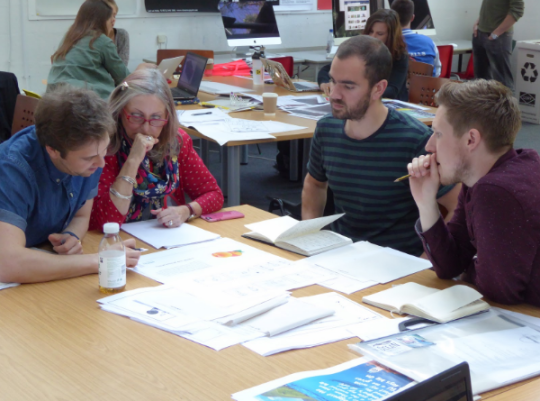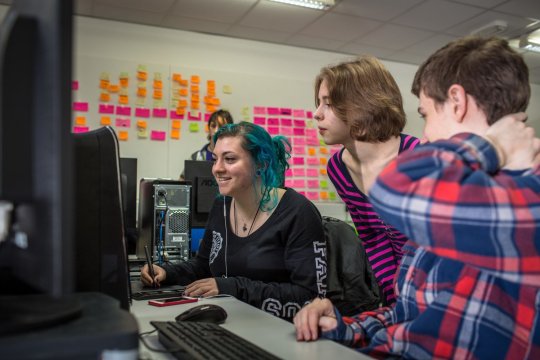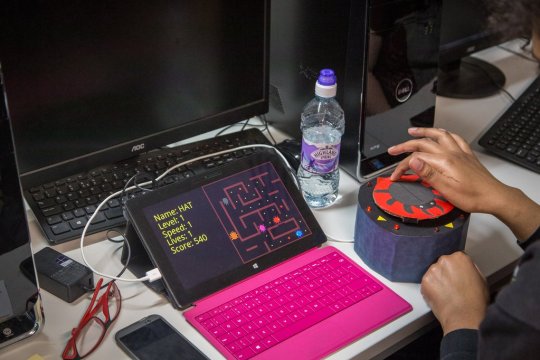Falmouth in Focus: Creative Advertising
In this series of articles we’ll be casting our gaze over some examples of practice currently being undertaken at Falmouth University. We work extensively with a variety of subjects and often find that the learning experiences are as diverse as those teaching on the courses.
This month we’re focusing on Creative Advertising within the School of Communication Design and one of the first pure Creative Advertising undergraduate degrees in Europe.

Jono Wardle, Senior Lecturer in Creative Advertising, discusses his use of tools and technologies to support the student experience below, based on building a response to the Jisc Digital Benchmarking principle ‘use digital systems to build a sense of belonging’.
I am focusing on the ‘use digital systems to build a sense of belonging’ benchmark because I’ve seen how digital systems can sometimes isolate some students, for whatever reasons, and I believe we have managed to go someway to enhance our students’ sense of belonging (and overall student experience) by using the most appropriate digital platform for all students today – Facebook.
Five years ago I was frustrated that some students failed to pick up their emails regularly or that their email boxes were so so full they couldn’t access them. I knew that they used texts all the time so I tried SMS messaging but there were technical difficulties on site (lack of signal!) and I couldn’t send links very easily etc. Then I tried Facebook (FB). I have never used Facebook before but my colleague and I set up a course page and asked all the students to sign up to it. At first there were suspicions, as some institutions were actually using FB to spy on their absent students, so we showed the students how to manage their privacy settings and vowed never to try to look at their own pages. Next we made FB student groups within the course and got our past graduates to join an alumni group as well.
Students and staff could post anything they wanted as long as it was course/subject related either on our wall or to their group. General questions from students ranging from “when’s the hand-in?” to “does anyone know who created the original Volkswagen campaign?” appeared on a daily basis. Students started to support each other, rather than going directly to tutors. The dissertation students started their own discussion group and a social sub-group formed for organising ‘extra-curricular activities’. Staff could post links and important information, room changes could be shared instantaneously with targeted groups and individuals and the course began to run a lot, lot smoother. A real sense of community began to emerge, especially with alumni chipping in too.
I have learnt a lot from student postings when they find new innovative work online and share it with the cohort and we post work placement opportunities and competitions. Also, FB has been very useful on study trips for keeping in touch with each other real time via smart phones. In short, the course couldn’t run as well as it does without it. (100% student satisfaction last year.)
There has been a mixed response from members of academic staff on other courses but as far as I’m concerned if it works, it works. I think the institution feels uncomfortable about using FB, but to me it’s like feeling uncomfortable about using Youtube as a learning tool because of it’s association with the evils of big business or frivolous kitten videos.
Most importantly, it works for our students. I think the key to successfully using online ‘tools’ is following where the target market (students) goes rather than trying to impose methods/tools in an institutional way…
This is a really intriguing real world example of creating a sense of belonging through technology. Institutional technologies, don’t always support social learning and Facebook, particularly the groups functionality, seems to work really well. Involving students in the process, is important to the NUS and the HEA and is broadly a feature of ‘outstanding’ practice in the JISC/NUS Digital Benchmark tool. Engaging in relevant social web technologies in a professional manner is also an important skill for staff and students to develop.
The approach to learning technology is key here. You could just as easily be using Twitter, Slack, WordPress etc etc, but by working with students and iterating as you go along, you find the perfect middle ground.

